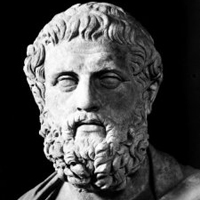Exploration into Man's Nature in Oedipus Rex
The unknown, the mysterious and the hidden always tempt human beings. By nature, we become curious to know what is veiled, what is at a far distance, what is invisible and ultimately what is unknown. The unknown welcomes our curious nature.

Sophocles
It is the basic nature of human beings to be curiously fascinated by the unknown. As far as knowledge is concerned, human beings could not help becoming the curiosity-monger of the unknown knowledge. In the case of both men and women, curiosity for hidden, veiled and unknown knowledge is equivalently applicable.
In Oedipus Rex the king Oedipus becomes enthusiastically eager to know about the root cause behind the ravages of pestilence and famine in the kingdom of Thebes. That is why, he sent Creon to Delphi Oracle forthright. Oedipus's sending Creon to Oracle is itself illustrative of man's obsessive curiosity to know about the costly arduous truth. Till Creon returned to Thebes, Oedipus was desperately waiting for the message of Apollo from the Delphic oracle. Having a brief talk to Creon Oedipus came to know that it is the presence of king Laius's murderer on Thebes that has hastened the ravages of pestilence and famine. As it was his duty as a king of Thebes, he publicly declared that he is bend upon tracking down the real murderer of king Laius. The hitherto unidentified murderer of king Laius had been supposed to be living in Thebes. His presence (the murderer's presence in Thebes) has been according to Oracle, causing the ravages of pestilence and famine in Thebes. Moreover, the oracle had said that until the unidentified murderer be sent out of Thebes, the country would never be free from the onslaught of pestilence and famine. This message delivered by the Delphic oracle posed a new challenge to the sovereign rule of king Oedipus. Oedipus publicly declared that he would track down and identify, and punish the real down and murderer of Laius, the former king of Thebes. Then Oedipus began to investigate. In line with his investigation Oedipus doubted even the sincerity of Creon. Intoxicated by the splendor of power Oedipus ridiculed and disregarded even the diamond advice of Teiresias.
The more Oedipus was bent upon exposing the authentic mystery regarding to the murderer of King Laius, the more obstinate he became. In point of fact, it is man's nature to be obstinately hell-bent upon reaching the destination of mysterious truth. Jocasta caught a glimpse of forthcoming misfortune in Oedipus's maddening stubbornness in his hunt for identifying the lurking murderer of Laius, the former king of Thebes, who was allegedly killed by a group of highway robbers. Jocasta prayed to Apollo for preventing Oedipus from giving continuity to his investigating. Even Theban shepherd did his level best in declining to reveal the real naked truth, the terrible of the terrible truth. Each and every successive attempt to stop Oedipus ended in humiliating failure. Oedipus is fatally addicted to the risky task of fulfilling the curious longing for the mysterious and the unknown. Oedipus, in this play, fell victims to the self-nature of man. It is man's nature to struggle to know what is tempting, mysterious and the wonderfully unknown. Oedipus's disposition is characterized by this nature. Hence Oedipus-Rex is an exploration into man's nature.
Oedipus Rex Study Center
Greek Tragic Vision Reflected in Oedipus Rex
Tension between Individual and State in Oedipus Rex
The Reversal of Events in Oedipus Rex
Plot Construction in Oedipus Rex
Dramatic Technique in Oedipus Rex
Oedipus Rex as a Classical Tragedy
Rationalist and Fatalist view in Oedipus Rex
 |
bachelorandmaster.com |